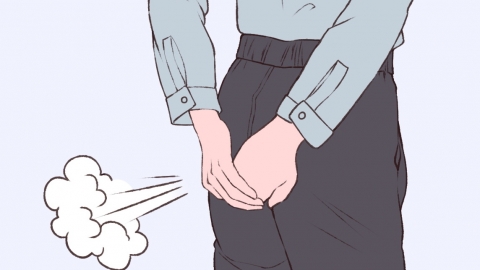What should I do if I keep passing gas after hemorrhoid surgery?
Excessive flatulence after hemorrhoid surgery may be caused by dietary factors, abnormal intestinal motility, reduced physical activity post-surgery, intestinal dysbiosis, or enteritis. This can be improved through dietary adjustments, promoting intestinal motility, increasing physical activity, and medication. If flatulence is accompanied by abdominal pain, rectal bleeding, or other symptoms, prompt medical attention is necessary.
1. Dietary factors: Consuming excessive gas-producing foods such as beans, onions, or frequently drinking carbonated beverages after surgery can increase intestinal gas. It is recommended to reduce intake of gas-producing foods, increase consumption of high-fiber fruits and vegetables, avoid carbonated drinks, and maintain a light, easily digestible diet.
2. Abnormal intestinal motility: Surgical procedures may irritate the intestinal mucosa, leading to disordered intestinal motility and impaired gas passage, resulting in gas accumulation. Gently massaging the abdomen in a clockwise direction is recommended to stimulate intestinal motility, facilitate gas expulsion, and relieve bloating discomfort.

3. Reduced postoperative activity: Prolonged bed rest after surgery slows intestinal motility, impairing digestion and causing food fermentation that produces excessive gas. When physically able, patients should get out of bed and begin moving as early as possible, gradually increasing activity levels to accelerate gas elimination.
4. Intestinal dysbiosis: Use of antibiotics or dietary changes after surgery may reduce beneficial gut bacteria while increasing harmful bacteria, disrupting microbial balance and increasing gas production. Under medical guidance, patients may take medications such as Bifidobacterium triple viable capsules, Bacillus licheniformis viable capsules, or lactasin tablets to alleviate symptoms.
5. Enteritis: Inflammation caused by irritation of the intestinal mucosa or bacterial infection after surgery can impair digestive function, leading to increased gas production along with abdominal pain and diarrhea. Under medical supervision, medications such as montmorillonite powder, norfloxacin capsules, or enteritis relief tablets may be used to relieve discomfort.
Maintain anal hygiene and keep the area clean and dry; wash with warm water after bowel movements. Eat regular, small, frequent meals, avoid spicy and greasy foods, and engage in moderate physical activity to promote digestion and support recovery of intestinal function, thereby reducing discomfort.




